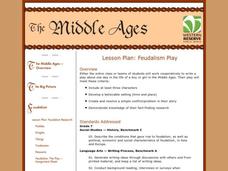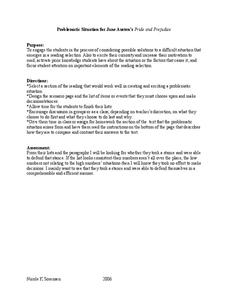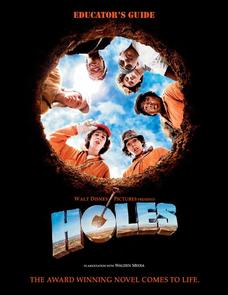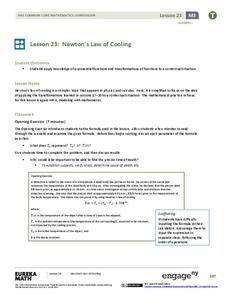Wild BC
Is Climate Change Good for Us?
Is it really that big of a deal if the global climate undergoes a little change? Young environmentalists consider this very question as they discuss in small groups the impact of different climate change scenarios on their lives, their...
Roy Rosenzweig Center for History and New Media
Slaves and Indentured Servants
In theory, at least, indentured servitude and slavery were two different practices in the American colonies. Class groups conduct a close reading of two primary source documents, one written by a slave and one by an indentured servant,...
Lesson Plans
Analogy of the Cell Project
Intended to supplement your existing cell function and organelle lessons, pairs work together to develop a real-world analogy for cell structures. In addition to writing paragraphs about the comparison, each group will make a short...
Northeastern Educational Television of Ohio, Inc.
Feudalism Play
Using research notes on feudal roles in medieval Europe, learners work cooperatively to write a play about one day in the life of a boy or girl in the Middle Ages.
Orange County Water Atlas
Location, Location, Location…
Young geographers discover not only how to read and recognize coordinates on a map, but also gain a deeper understanding of latitude and longitude and how climate changes can vary significantly across latitudes.
Atlanta History Center
What if YOU Lived During Jim Crow?
Young historians envision what life was like for African Americans living in the Jim Crow South through hands-on, experiential activities.
Macmillan Education
Networking
"It's not what you know, it's who you know." Learners discuss and analyze this age-old adage by completing life skills worksheets, collaborative activities, and discussions regarding the nature of networking and how it may improve future...
Curated OER
Pride and Prejudice: Problematic Situation
What would you do if your sister ran off with a man whom you didn't trust? Explore a scenario based on Jane Austen's Pride and Prejudice. Once kids work though the problem, they read the appropriate chapters from the book and write a...
Brigham Young University
Rosencrantz and Guildenstern Are Dead: Word Squares
Encourage your class to use a variety of strategies to learn and retain vocabulary words. The plan suggests that near the beginning of your reading of Rosencrantz and Guildenstern Are Dead pupils should find words in the text that are...
K12 Reader
African American Inventors: Granville T. Woods
Get to know inventor, Granville T. Woods. Who is he? From what state did Woods come? What did he design? All questions your scholars will find the answers to with this response-to-reading worksheet.
Houghton Mifflin Harcourt
Surprise!: Challenge Activities (Theme 2)
Surprise! is the theme of this series of challenge activities. The surprise comes from the information your scholars will discover when researching topics such as alligators and crocodiles, living in other countries, becoming a...
Curated OER
Educator's Guide: Holes
You'll be a star at your next grade level meeting with an educational unit on Louis Sachar's Holes. Based on both the novel and film, the lessons include applications to language arts with character studies and movie reviews; social...
Habits of Mind
Thinking Interdependently
Transform your class into a team with a lesson about thinking and working interdependently. As they reflect on important roles for a group, elementary and middle schoolers learn to work together and think of ways that compliment each other.
Choose My Plate
MyPlate Word Blanks
Create a silly cooking themed story using nouns, adjectives, verbs, and more! Pupils fill in the blanks using their knowledge of different types of fruit, vegetables, grains, protein, and dairy, then read the story aloud to hear a whacky...
Laboratory for Atmospheric and Space Physics
Planetary Distances on the Playground
There's no need to stay inside; get out of the classroom and create a scaled map of the solar system on your playground field! In collaborative groups, scholars identify the distance between the sun and other planets, place planet...
Laboratory for Atmospheric and Space Physics
A Classroom Solar System
Create a scaled model of our solar system in your classroom! Scholars work collaboratively to build paper mache planets and hang them in their proper position to showcase each planet's location in the solar system.
EngageNY
Newton’s Law of Cooling
As part of an investigation of transformations of exponential functions, class members use Newton's Law of Cooling as an exponential model to determine temperature based on varying aspects. The resource makes comparisons between models...
PHET
Iron Filings and Magnetic Field Lines
How do magnetic fields differ? Allow scholars to see the difference between 2-D and 3-D magnetic fields. They construct models of both and observe how they are similar and different. It is the fifth installment of an 18-part unit.
EngageNY
Percent of a Quantity
Visualize methods of finding percents. Classmates find a percent of a quantity using two methods including a visual model in the 26th lesson in a series of 29. By the end of the lesson, scholars find percents given a part and the whole...
NOAA
What Killed the Seeds?
Can a coral cure cancer? Take seventh and eighth grade science sleuths to the underwater drugstore for an investigation into emerging pharmaceutical research. The fifth installment in a series of six has classmates research the wealth of...
Beyond Benign
Water Bottle Unit
How much plastic do manufacturers use to create water bottles each year? The class explores the number of water bottles used throughout the years to determine how many consumers will use in the future. Class members compare different...
DiscoverE
Air Train
Train your pupils to be master engineers. Young learners design a train that travels along a fishing line. The train needs to safely carry pennies as passengers without falling out.
Science Matters
Matter Cycles — Sum It Up
Scholars become part of the cycle of matter with a reader's theater that showcases producers, consumers, decomposers, and the sun. A diagram and discussion concludes the learning experience and enhances comprehension.
Student Achievement Partners
Eleven
Turning 11 comes with a range of emotions. Explore those emotions by reading the short story "Eleven" by Sandra Cisneros. Readers analyze the main character's reactions to the events of her day. Then, they write an essay describing what...
Other popular searches
- Telling Time
- Elapsed Time
- Time Zones
- Time Management
- Time and Timekeeping
- Circle Time
- Time Line
- Medieval Times
- Telling Time Lesson
- Timelines
- Geologic Time
- Elapsed Time Worksheets

























